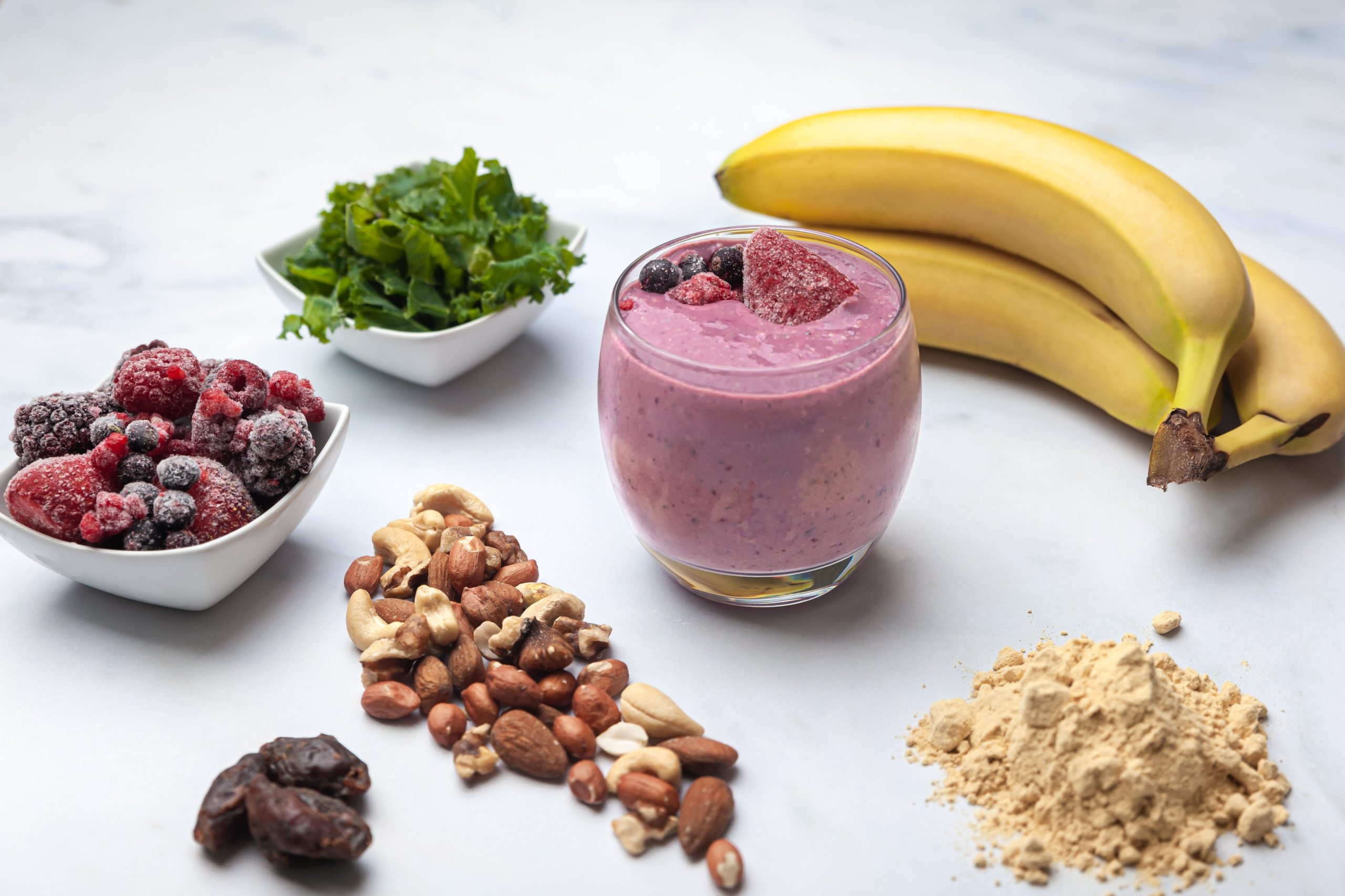Our hunter-gatherer ancestors recognized the importance of protein in the diet and went to great lengths to hunt and fish natural sources of the valuable nutrient. Lucky for us, sourcing protein has become much easier. We can bring home pre-butchered meat with the swipe of a credit card or choose double chocolate pea protein, vanilla collagen protein or cookie dough whey protein isolate right off a shelf. Protein powder offers variety and convenience, but how do they compare nutritionally to natural protein sources?
If you recall one fact from science class, it is probably that amino acids are the building blocks of the human body. Varying combinations of 22 amino acids form proteins that make up skin, nerves, muscles, organs, hormones and enzymes. Nine of the 22 amino acids are considered “essential” because they cannot be made by the body and must be included in the diet. The other 13 amino acids are considered “nonessential” because the body can make them as long as the diet provides an adequate supply of the essential amino acids.
Protein sources are categorized as complete or incomplete proteins. Complete proteins provide all nine essential amino acids and are considered superior to incomplete proteins. Natural animal proteins like beef, fish and eggs as well as soy and most protein powders including whey, collagen and vegan protein blends are complete proteins. They provide all nine essential amino acids as well as many of the nonessential amino acids. Vegetarian sources of protein including legumes, grains, nuts and seeds are considered incomplete proteins because they are each lacking several of the essential amino acids. According to “Staying Healthy with Nutrition” by Elson M Haas, MD, combining a variety of incomplete protein sources in the diet, like vegetables, grains, nut and legumes, provides a healthy balance of the nine essential amino acids.
Natural protein sources and protein powders are both complete proteins, however the rest of their nutritional profile is very different. Protein powders are a single isolated macronutrient. They provide 18–25 grams of protein, no fat, minimal carbohydrate and virtually no vitamins and minerals. Nature does not provide protein in isolation. In fact, nature does not provide any macro or micronutrient in isolation.
Natural proteins like beef, chicken, dairy and eggs contain a balanced blend of protein, fat, vitamins and minerals. These nutrients are complimentary and work together synergistically. For example, the body requires vitamins A and D in order to build and repair tissues from dietary protein. Nature ensures that vitamins A and D are available with protein by packaging proteins with vitamin A- and D-rich fats. Eggs are a perfect example. Egg whites provide protein while the yolks provide fat, vitamin A and vitamin D. Natural animal protein sources also provide unique nutrients not found in protein powders like B12 in red meat, B6 in animal fats, omega-3 fatty acids in fish and choline in egg yolks.
Whole foods (foods that have been minimally processed and are free of additives) in their most natural form will always provide more nutrients and health benefits than any isolated nutrient. In order to simulate the nutrient density of a piece of salmon, you would have to eat one to two scoops of protein powder along with a handful of supplements, including omega-3, iodine, selenium, magnesium, vitamin D and vitamins B3, B6 and B12. Even then, the proportions of each nutrient would not be balanced for optimal nutrition.
Nutrient-dense, whole food, natural protein sources should be the star of your diet while protein powders can play a supporting role. High-quality protein powders (organic, grass-fed, cold-processed, no added sugars) are convenient and easily digestible. They are best used post-workout to support muscle protein synthesis and recovery or as part of a quick snack or meal when you are short on time.
Recipes
Post-Workout Shake
Easily digestible protein and carbohydrate are ideal post workout.
Ingredients:
- 1–2 scoops high-quality protein powder
- 4–6 ounces fruit juice
- Ice
Combine the ingredients in a shaker bottle, shake and enjoy.
Breakfast Smoothie
A well-balanced meal includes protein, carbohydrate, fat, vitamins and minerals. Be sure to include each of these components when using protein powder as part of a quick meal.
Ingredients:
- 1–2 scoops high-quality protein powder
- ¼ – ½ avocado
- Handful of frozen berries
- ½ frozen banana
- ⅓ cup frozen riced cauliflower
- Handful of spinach or 1 scoop greens powder
- Sprinkle of cinnamon
- Pinch of sea salt
- 1- 1 ½ cups water or unsweetened almond milk
- 3-4 ice cubes
Blend all ingredients in a blender or Magic Bullet and enjoy.
Related articles:
Money Talks: Financial-Help Books To Help You On Your Journey!
How To Get Your Blood Flowing At The Office!
Pros And Cons Of Soy: Should You Add It To Your Diet?
Losing Your Zzzz’s? What To Do About Insomnia

